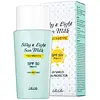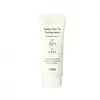What's inside
What's inside
 Key Ingredients
Key Ingredients

 Benefits
Benefits

 Concerns
Concerns

 Ingredients Side-by-side
Ingredients Side-by-side

Water
Skin ConditioningCyclopentasiloxane
EmollientMethyl Methacrylate Crosspolymer
Ethylhexyl Methoxycinnamate
UV AbsorberEthylhexyl Salicylate
UV AbsorberLauryl PEG-10 Tris(Trimethylsiloxy)Silylethyl Dimethicone
EmulsifyingButyl Methoxydibenzoylmethane
UV AbsorberNiacinamide
SmoothingBis-Ethylhexyloxyphenol Methoxyphenyl Triazine
Skin ConditioningButyloctyl Salicylate
Skin ConditioningSodium Chloride
MaskingMethylene Bis-Benzotriazolyl Tetramethylbutylphenol
UV FilterDecyl Glucoside
CleansingXanthan Gum
EmulsifyingPropylene Glycol
HumectantCyclohexasiloxane
EmollientGalactomyces Ferment Filtrate
HumectantButylene Glycol
HumectantEthyl Hexanediol
SolventCucumis Sativus Fruit Extract
EmollientAloe Barbadensis Leaf Extract
EmollientVaccinium Angustifolium Fruit Extract
Skin ProtectingPropolis Extract
Skin ConditioningZanthoxylum Piperitum Fruit Extract
Skin ConditioningPulsatilla Koreana Extract
Skin ConditioningUsnea Barbata Extract
Isononyl Isononanoate
EmollientPhenoxyethanol
PreservativeDisteardimonium Hectorite
Stabilising1,2-Hexanediol
Skin ConditioningCaprylyl Glycol
EmollientParfum
MaskingAdenosine
Skin ConditioningAllantoin
Skin ConditioningDipotassium Glycyrrhizate
HumectantDisodium EDTA
Water, Cyclopentasiloxane, Methyl Methacrylate Crosspolymer, Ethylhexyl Methoxycinnamate, Ethylhexyl Salicylate, Lauryl PEG-10 Tris(Trimethylsiloxy)Silylethyl Dimethicone, Butyl Methoxydibenzoylmethane, Niacinamide, Bis-Ethylhexyloxyphenol Methoxyphenyl Triazine, Butyloctyl Salicylate, Sodium Chloride, Methylene Bis-Benzotriazolyl Tetramethylbutylphenol, Decyl Glucoside, Xanthan Gum, Propylene Glycol, Cyclohexasiloxane, Galactomyces Ferment Filtrate, Butylene Glycol, Ethyl Hexanediol, Cucumis Sativus Fruit Extract, Aloe Barbadensis Leaf Extract, Vaccinium Angustifolium Fruit Extract, Propolis Extract, Zanthoxylum Piperitum Fruit Extract, Pulsatilla Koreana Extract, Usnea Barbata Extract, Isononyl Isononanoate, Phenoxyethanol, Disteardimonium Hectorite, 1,2-Hexanediol, Caprylyl Glycol, Parfum, Adenosine, Allantoin, Dipotassium Glycyrrhizate, Disodium EDTA
Water
Skin ConditioningButyloctyl Salicylate
Skin ConditioningDibutyl Adipate
EmollientPropanediol
SolventButylene Glycol
HumectantBis-Ethylhexyloxyphenol Methoxyphenyl Triazine
Skin ConditioningEthylhexyl Triazone
UV AbsorberDicaprylyl Carbonate
EmollientTitanium Dioxide
Cosmetic ColorantDiethylamino Hydroxybenzoyl Hexyl Benzoate
UV FilterHydrogenated Poly(C6-14 Olefin)
Emollient1,2-Hexanediol
Skin ConditioningCentella Asiatica Extract
CleansingPolyglyceryl-2 Stearate
EmulsifyingAluminum Hydroxide
EmollientGlyceryl Stearate
EmollientStearyl Alcohol
EmollientSodium Polyacrylate
AbsorbentStearic Acid
CleansingPolyhydroxystearic Acid
EmulsifyingBehenyl Alcohol
EmollientPolymethylsilsesquioxane
Ethylhexyl Stearate
EmollientAmmonium Acryloyldimethyltaurate/Vp Copolymer
Caprylyl Glycol
EmollientTrideceth-6
EmulsifyingEthylhexylglycerin
Skin ConditioningXanthan Gum
EmulsifyingMadecassoside
AntioxidantAsiaticoside
AntioxidantAsiatic Acid
Skin ConditioningMadecassic Acid
Skin ConditioningWater, Butyloctyl Salicylate, Dibutyl Adipate, Propanediol, Butylene Glycol, Bis-Ethylhexyloxyphenol Methoxyphenyl Triazine, Ethylhexyl Triazone, Dicaprylyl Carbonate, Titanium Dioxide, Diethylamino Hydroxybenzoyl Hexyl Benzoate, Hydrogenated Poly(C6-14 Olefin), 1,2-Hexanediol, Centella Asiatica Extract, Polyglyceryl-2 Stearate, Aluminum Hydroxide, Glyceryl Stearate, Stearyl Alcohol, Sodium Polyacrylate, Stearic Acid, Polyhydroxystearic Acid, Behenyl Alcohol, Polymethylsilsesquioxane, Ethylhexyl Stearate, Ammonium Acryloyldimethyltaurate/Vp Copolymer, Caprylyl Glycol, Trideceth-6, Ethylhexylglycerin, Xanthan Gum, Madecassoside, Asiaticoside, Asiatic Acid, Madecassic Acid
 Reviews
Reviews

Ingredients Explained
These ingredients are found in both products.
Ingredients higher up in an ingredient list are typically present in a larger amount.
1,2-Hexanediol is a synthetic liquid and another multi-functional powerhouse.
It is a:
- Humectant, drawing moisture into the skin
- Emollient, helping to soften skin
- Solvent, dispersing and stabilizing formulas
- Preservative booster, enhancing the antimicrobial activity of other preservatives
You might know this ingredient as Tinosorb S or Bemotrizinol. It is a UV filter that covers both UVA and UVB rays.
This ingredient has two peak UV absorption peaks ( 310 and 340 nm) and is able to absorb both UV-A and UV-B rays. This ingredient works by preventing UV rays from reaching and damaging your skin.
On top of that - it is highly photostable and helps prevent the photodegration of other sunscreen ingredients such as avobenzone.
Tinosorb S is allowed in the EU, Australia, and Asia. It is close to being approved by the FDA and we'll hopefully get this ingredient in the U.S. by late 2025.
Fun fact: Tinosorb S is the most effective UV absorber at maximum concentration (measured by SPF) permitted in the EU.
This ingredient is oil-soluble, so your oil-cleansers will take this right off at night.
Learn more about Bis-Ethylhexyloxyphenol Methoxyphenyl TriazineButylene Glycol (or BG) is used within cosmetic products for a few different reasons:
Overall, Butylene Glycol is a safe and well-rounded ingredient that works well with other ingredients.
Though this ingredient works well with most skin types, some people with sensitive skin may experience a reaction such as allergic rashes, closed comedones, or itchiness.
Learn more about Butylene GlycolButyloctyl Salicylate is a chemical UV filter structurally similar to octisalate. It is a photostabilizer, SPF booster, emollient and solvent. This ingredient helps evenly spread out ingredients.
According to a manufacturer, it is suitable for pairing with micro Titanium Dioxide, Zinc Oxide, and pigments.
Photostabilizers help stabilize UV-filters and prevents them from degrading quickly.
Learn more about Butyloctyl SalicylateCaprylyl Glycol is a humectant and emollient, meaning it attracts and preserves moisture.
It is a common ingredient in many products, especially those designed to hydrate skin. The primary benefits are retaining moisture, skin softening, and promoting a healthy skin barrier.
Though Caprylyl Glycol is an alcohol derived from fatty acids, it is not the kind that can dry out skin.
This ingredient is also used as a preservative to extend the life of products. It has slight antimicrobial properties.
Learn more about Caprylyl GlycolWater. It's the most common cosmetic ingredient of all. You'll usually see it at the top of ingredient lists, meaning that it makes up the largest part of the product.
So why is it so popular? Water most often acts as a solvent - this means that it helps dissolve other ingredients into the formulation.
You'll also recognize water as that liquid we all need to stay alive. If you see this, drink a glass of water. Stay hydrated!
Learn more about WaterXanthan gum is used as a stabilizer and thickener within cosmetic products. It helps give products a sticky, thick feeling - preventing them from being too runny.
On the technical side of things, xanthan gum is a polysaccharide - a combination consisting of multiple sugar molecules bonded together.
Xanthan gum is a pretty common and great ingredient. It is a natural, non-toxic, non-irritating ingredient that is also commonly used in food products.
Learn more about Xanthan Gum